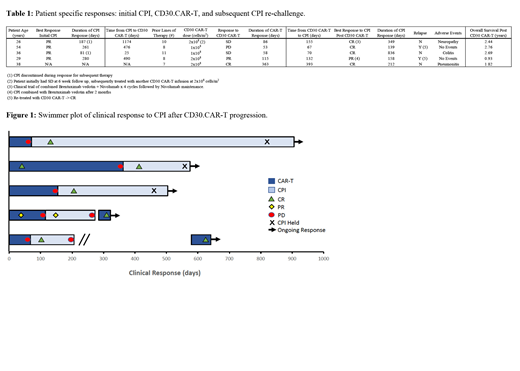Background: The safety and efficacy of treating pts with relapsed/refractory (r/r) CD30+ lymphomas with chimeric receptor modified T cells targeting the CD30 molecule (CD30.CAR-T) has been recently demonstrated (Grover et al., ASH 2018). Expression of PD-1 on CD30.CAR-T cells has been observed post-infusion at the time of disease recurrence. To determine the safety and efficacy of anti-PD-1 mAb therapy (CPI) post CD30.CAR-T cell therapy, we present a retrospective cohort review of pts with r/r Hodgkin lymphoma (HL) who subsequently received CPI after CD30.CAR-T progression.
Methods: We followed and analyzed the clinical outcome of 5 pts with r/r HL who progressed after CD30.CAR-T cell therapy at the University of North Carolina at Chapel Hill and subsequently received CPI to treat relapsed disease. Clinical responses in follow up were determined per local radiologist assessment.
Results: Prior to CAR-T cell therapy, the average age of the pts in this cohort was 36 years old (range, 26-54). Four of the five had been treated with CPI prior to CD30.CAR-T therapy, with a median duration of response of 224 days (range, 81-280) and best objective response being a partial response (PR) for all 4 pts. The median time from CPI to CD30.CAR-T therapy was 483 days (range, 25-1174 days).
A total of 5 pts have been treated with CPI following clinical progression after CD30.CAR-T. All pts were heavily pre-treated with a median of 8 therapies prior to CD30.CAR-T. One pt received a second infusion of CD30.CAR-T after having stable disease (SD) 6 weeks following the first infusion. Following CD30.CAR-T infusion, 1 pt initially had a complete response (CR), 1 pt had a PR, 2 pts had stable disease (SD), and 1 pt had progressive disease (PD). All 5 pts subsequently developed PD.
The median time from CD30.CAR-T to CPI was 132 days (range, 67-393 days), (Table 1). Of the 5 pts evaluable for response, 4 pts achieved a CR and 1 pt achieved a PR (Figure 1). At the time of data cutoff, the median duration of response was 212 days (range 139-836) with ongoing response in 3 pts. Two pts developed recurrent disease following CPI and were again treated with CD30.CAR-T cell therapy, achieving a 2nd CR in both cases. CPI use was associated with the expected toxicities. One pt developed neuropathy, leading to therapy discontinuation after 8 months of therapy. Another pt developed grade 3 colitis, resulting in discontinuation of therapy after 25 months of therapy. A third pt developed pneumonitis (prior mediastinal radiation), with discontinuation of therapy after 8 months of therapy. All pts were still alive at last follow up with a median overall survival of 2.44 years (range, 0.93-2.76) from initial CD30.CAR-T cell therapy.
Conclusion: To our knowledge, this is first report of pts with r/r HL who received CPI after CD30.CAR-T cell therapy. Though limited by size, this cohort demonstrates clinical efficacy of CPI after CD30.CAR-T even in those pts who had progressed after previous treatment with CPI. All pts achieved an objective response with CPI administered for relapsed disease after CD30.CAR T cell therapy. Four of five of these patients achieved a CR and 3 patients achieved an improved response when compared to CPI prior to CD30.CAR-T. Combination of CPI and CD30.CAR-T may be an attractive study design in the future for r/r HL.
Grover:Seattle Genetics: Consultancy. Park:BMS: Consultancy, Research Funding; Rafael Pharma: Membership on an entity's Board of Directors or advisory committees; G1 Therapeutics: Consultancy; Teva: Consultancy, Research Funding; Gilead: Speakers Bureau; Seattle Genetics: Research Funding, Speakers Bureau. Savoldo:Baylor College of Medicine: Patents & Royalties: CAR.CD30 patent; Bluebirdbio: Other: research agreement; Cell Medica: Other: Research Agreement; Bellicum: Other: Research Agreement. Serody:Merck: Research Funding; GlaxoSmithKline: Research Funding.
Author notes
Asterisk with author names denotes non-ASH members.


This feature is available to Subscribers Only
Sign In or Create an Account Close Modal